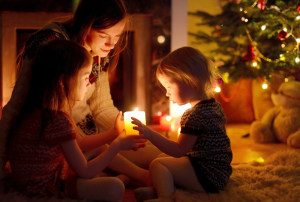Modern Families – what does the future hold?
 From the extended family to the nuclear family and now quite often the single family, the core structure of our society has been undergoing a metamorphosis for some time now. What will the future concept of modern families look like?
From the extended family to the nuclear family and now quite often the single family, the core structure of our society has been undergoing a metamorphosis for some time now. What will the future concept of modern families look like?
American TV series appear to have a fascination for families. For decades they espoused ‘family values’ and how family is one of the cornerstones of life, but more recent hits such as Modern Family indicate just how much the goalposts have moved even in the US.
The popular sitcom follows a familiar feel-good approach in tracking the lives of an all-American family – but this is a family with its feet firmly rooted in the 21st century. The patriarch of the family is not only remarried, but his younger wife is a gorgeous Latina with a teenage son from an earlier relationship, while his son is married to a man and only his daughter’s family still fits the mould of what once, not so long ago, would have been as a typical, desirable heterosexual nuclear family. At heart not that much has changed, for the underlying message is that – different, diverse and with warts and all – family remains an important anchor in one’s life, and in a way it’s hard to argue with that.
We all need a sense of identity that extends beyond the fact that you’re from this town in that country. Family provides this sense of identity and belonging; or at least, it has done since tribal bands first started settling in small villages many thousands of years ago. Today we find ourselves in an age of accelerated motion brought on by technological advances, altered economic realities and an accompanying change in our social structure and behavioural patterns. Where many in less developed parts of the world still cluster closely in extended family and tribal identities, the inhabitants of the advanced world are increasingly detached from such things.
 A sense of belonging
A sense of belonging
Their need for identity is just as strong, but they seek it in ‘manmade’ tribes defined by mutual affinity in things such as sports, fashion, politics, technology and increasingly, ethnic or religious origin. But the demise of the family in the Western world is not an isolated event; it is related to a social process in which the sense of proudly belonging to a certain community has been replaced by an increasing focus on individualism, isolation and even cynicism. Many of today’s generations’ only belief system is that they believe in nothing and trust even less. This in stark contrast with the past and with non-Western societies where allegiances are at times dangerously strong.
The more we focus on the self as opposed to the whole, the more we isolate ourselves and feel a sense of loss. Human beings are advanced apes, and apes are social creatures – ergo, people need people. Having all the riches in the world but no-one to share or show them off to renders them more or less useless, yet we seek fulfilment in wealth, opulence, hedonism, thrill-seeking, work, ambition, fame or sometimes simply the bottle to fill the void. Those who sense the loss of tribe or identity join groups of similarly minded folk, but the American TV producers would argue that these are poor replacements for the real thing, family, and since many modern ‘tribes’ exist only ‘online’ they could well be right.
From extended, to nuclear, to …?
Though one is tempted to, it remains hard to judge such situations, as for every pro there can be a con, and vice versa. Looking back to the days of extended families looking out for one another provokes a strong sense of nostalgia – part of a lost sense of community overall – but in the past such strong bonds were often the product of lack of opportunity. Lack of opportunity to travel, so the whole clan lived and died within a relatively small geographical range, but also the lack of family planning, which saw women chained to and families financially burdened by large numbers of children. This is where large parts of the world remain today, but the likelihood is that they will eventually join our family-less society.
We didn’t go from having our grandparents, uncles, aunts and countless cousins and siblings within close range to suddenly living anonymously on the tenth floor. What came in between was a gradual process by which individualism fought community and triumphed. As fewer children were born and families reduced in size began to move in search of greater career opportunities, so the post-war era saw the conversion to the so-called nuclear family that many of us today have grown up in. With grannies, uncles and aunts further removed from our daily lives we became more insular, focusing inwardly on a smaller nuclear consisting of mum, dad and a much smaller brood.
Active family time and manual labour were replaced with recreation, the kitchen replaced by the TV room as the place where the household came together. These were still the times when children spent most of their youth growing up outdoors with the neighbourhood kids, a factor that has since all but died out. Most of us will have grown up this way, but in today’s angst-ridden, mobile phone dominated world kids are more eager to spend their lives in front of some form of screen. Many still grow up in nuclear families, but with even smaller numbers of children born and few marriages going the distance, not to mention the exponential growth in single parents, that is hardly the norm anymore.
Just as many members of the newer generations have been weaned in single-parent households, passed around between divorcees or form part of ‘mergers’ of second marriages and their children. It’s a more diverse and complicated world in every way, and one in which the geographical distances have continued to grow as boundaries shrink and people trot the globe in search of happiness and a better way of life. Here technology has provided a very helpful hand, offering dozens of forms of communication, from Facebook and Snapchat to Skype, that allow us to stay in touch with family and friends many thousands of kilometres away.
Will the family survive?
Predictions are hard to make, but while the actual definition of family as limited to biological kin may have to be broadened to include a sense of kin, whether by situation or choice of association, it seems likely that the idea of family – of belonging to a group of people who are bound to one another – will continue. Human beings have been on a path of individualisation for a long time, and in some quarters the desire for a greater sense of togetherness is being voiced, so let’s hope we don’t fall into a dystopian future of isolation but realise in time that family, community – call it what you will – is part of what make us whole.
First published in Essential Magazine, December issue P.52












